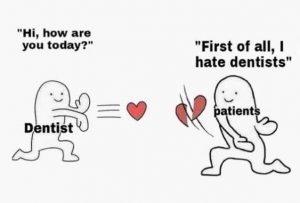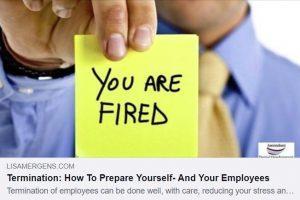“#15 • “I’ll just let her go. What could possibly go wrong?”
THIS BLOG IS OUT-OF-DATE!
This blog was moved in 2019 and renamed "Dental FraudBusters"
“I’ll just let her go”
These are the first words that many dentists think when confronted with employee dishonesty.
They rationalize that the best solution to their dishonesty problem is to terminate the person’s employment and “move on”.
No rational person enjoys confrontation
Confrontation is unpleasant and most of us innately want to avoid it. This behavior is even more pronounced in dentists, who by virtue of their profession, are less confrontational than the general public.
and, they have good reason to feel this way.
Each and every workday, dentists everywhere are confronted by patients who say (or scream) that they “hate” dentists.
Dentistry is a profession where you soon learn that “comfort, conciliation and compassion” are better tools than “conflict and confrontation.”

Let’s face it, no one enjoys accusing an employee of stealing.
Many dentists have told me they do not want to confront their employee. They fear making wrongful accusations and this doubt serves to reinforce their gut feeling to terminate employment “without cause”.
While “just letting her go” satisfies the immediate goal of removing the offending employee from the practice, there are many unexpected consequences that can emerge when you do it this way. (if you suspect employee dishonesty and the person is still working for you, then please call me. I can help)
Here’s what can go wrong when you decide to “let go” a dishonest employee
When you fire a dishonest employee “without cause”, it emboldens their belief that that “I got away with it!”
This confidence may cause them to do more things to harm you, your finances, practice and reputation. Here are a few real and likely issues that can unexpectedly come up when you fire a dishonest employee without cause.
YOUR EX-EMPLOYEE IS HIRED BY ANOTHER OFFICE
Soon after firing your employee, you learn they were hired by another dentist.

Ugh… now “your problem” has become “their problem”. I can only imagine how much this would gnaw at my conscience for a long time.
Many dentists have found out months, or even years later, that the other office fired their former employee for stealing.
What’s even worse is when you happen to bump into the dentist that hired your dishonest employee at a CE event and the “conversation” you have been dreading all this time finally comes up. Awkward…..
THEY “BAD-MOUTH” YOU AND YOUR PRACTICE
There is a high probability that your former employee that will start to bad-mouth you at her new workplace, to her friends, your patients and even on social media.
 They will slander you with frivolous allegations, such as drug or alcohol abuse, insurance fraud, pedophilia, psychological illness, sexual assault, marital affairs, gambling addict, violent personality, and the list goes on.
They will slander you with frivolous allegations, such as drug or alcohol abuse, insurance fraud, pedophilia, psychological illness, sexual assault, marital affairs, gambling addict, violent personality, and the list goes on.
They do this is in their interest to tarnish your reputation as it helps to build a wall between you and the new office where they work.
THEY CONTINUE TO STEAL FROM YOU, YOUR EMPLOYEES AND PATIENTS
While your employee was working for you, they had access to information about you, as well as your employees, patients and business.
After you have fired the employee, they can use this information to withdraw money from your bank account, obtain credit lines or credit cards in your name. (yes, it is easier than you are thinking)

You may also be unexpectedly billed for things you did not purchase. For example, if you have a charge account with a local merchant (business supplies, furniture, etc) your former employee may be successful in charging items to your account.
They may use the credit card information they obtained from you, your employees and patients to commit additional frauds, months after they have been fired.
YOU ARE SUED FOR WRONGFUL TERMINATION
All dishonest employees have a strong sense of self-entitlement towards their employer’s money, and this self-entitlement does not stop after they have been fired.
When you fire an employee “without cause”, they may engage an employment lawyer and threaten to sue you.
 Here is a what happened in one case. (I have left out many details)
Here is a what happened in one case. (I have left out many details)
The dentist suspected, but had not yet confirmed that his employee was stealing. He just “let her go”. The former employee soon filed a wrongful termination suit.
The dentist then hired me to do an examination to confirm if his suspicions of fraud were true. I uncovered approximately $60,000 in theft, and submitted my report of losses to the dentist.
The dentist wanted to use the $60,000 theft as ammunition against in the wrongful termination lawsuit. It did not go well. The judge told the dentist that the theft was not admissible in the wrongful termination lawsuit and instructed the dentist to press charges or sue his former employee for the $60,000.
The court said that when the dentist fired his employee, he did not do it for theft or misconduct. He just “let her go”.
Because the theft was discovered after she was fired, the dentist lost the wrongful termination lawsuit and was ordered to pay $80,000 to his former employee.
YOUR PATIENTS START COMPLAINING
Dishonest employees use various methods to conceal their thefts. These methods invariably leave a trail of adulterated records behind in your office.
Soon after the employee is gone, your patients may start complaining that their statements are not correct. “I already PAID THIS! Why is is still showing as being owed?” Your staff will not know how to properly respond to these patient complaints.
Patients can lose faith in your office. “If they can’t keep my account straight, how can they do dentistry?”
YOUR UNEMPLOYMENT TAX GOES UP

In many states, being fired for cause or misconduct will bar the employee from receiving unemployment benefits.
When you do not fire for cause or misconduct, your former employee will likely get unemployment benefits and you will see an increase in your Federal Unemployment Tax payments.
Now, that’s like being ripped off twice! The employee stole from you, and now you are paying increased unemployment taxes as a result.
This is a jagged and bitter pill to swallow.
PATIENTS LEAVE YOUR PRACTICE
If a dishonest employee has been in the practice for many years, they will have developed friendships and relationships with many patients. Those patients will ask about the employee when they no longer see them practice.
“Why is she not working here anymore?” “What happened to Janie, where is she gone?”
Some patients will see you as the “bad person” in this matter and leave your practice. (yes, this happens) Those patients believe you fired someone they liked or considered a friend – for no good reason.
INSURANCE COMPANIES START ASKING QUESTIONS OR WANT TO AUDIT
It is common for a dishonest employee to commit healthcare fraud by over-billing insurance companies for work that was not done. These schemes can go on for months or years, all under the watchful eye of a dishonest employee.
 The dishonest employee was the person responding (and quelling) questions by patients and insurance companies regarding charges.
The dishonest employee was the person responding (and quelling) questions by patients and insurance companies regarding charges.
Now that the employee is gone, no one is there to deflect questions from the insurance companies and patients. Your new staff are not prepared to respond to these questions.
Employee perpetrated healthcare fraud wound up costing one dentist over a quarter-million dollars, that she was required to repay back to the insurance companies.
YOU SET A BAD EXAMPLE TO STAFF
The employees that remain with your practice after you have “let her go” may view you as a “weak” boss and leader. Certain employees may believe that you should have investigated and fired her for theft. Some employees have quit and gone elsewhere for this reason alone.
How to “fire” a dishonest employee
PUT THE ONUS ON THE EMPLOYEE

When you initially discover theft and want to fire the employee immediately, but only have a few allegations or suspicions to go on, I recommend using a reverse onus approach.
I strongly caution anyone following this method without professional guidance, and I can help.
There is a a lot of paperwork, instructions and rehearsal required to properly execute and document the events. Feel free to contact me for more information.
GENERAL STEPS TO FOLLOW
The safest approach is to provide the employee with an employment suspension letter giving notice to the allegations that have been uncovered, and to provide the employee with 2 business days to respond to the allegations in the letter.
If the employee fails to respond, or their response is not satisfactory, their employment will be terminated accordingly.
If the allegations are clear and compelling, it unlikely that your employee will be able to provide a meaningful response to absolves them of their dishonesty.
If the employee does provide a suitable explanation, then their employment suspension is lifted, and they are paid for the time while they were on suspension. This is just one reason why the allegations against the employee must be clear and compelling – you do not want them to offer any plausible explanation that would clear them.
Using this approach, should the employee subsequently commence a wrongful employment termination action against you, or seek unemployment contributions, then taking this step will demonstrate that you gave the employee every opportunity to explain their conduct, and they failed to do so.
Initial consults are complimentary and confidential
I am always happy and grateful when dentists contact me for guidance.
If you have questions or concerns, please do not hesitate to contact me for a consult.
How to mentally prepare yourself before terminating employment
Lisa Mergens has some good suggestions on how to mentally prepare for an employment termination, written from the perspective of when you are firing someone “without cause”.





